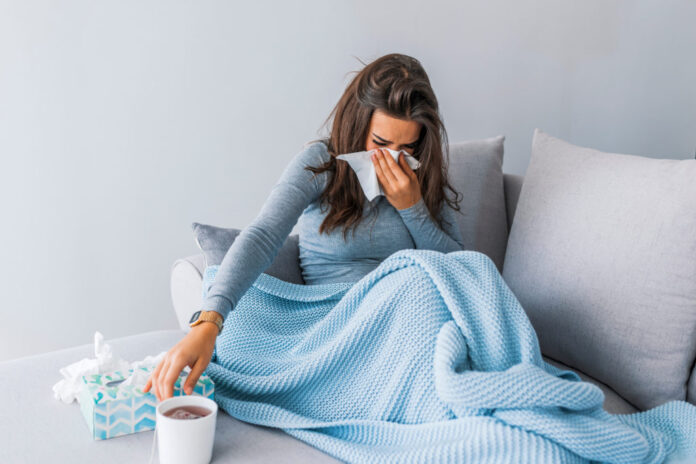While many people think of allergies as seasonal, caused by grass and tree pollen, the additional time spent indoors during the winter months, can also induce allergic reactions in many.
Marli Botha, OTC Product Manager for Pharma Dynamics, says most people don’t associate cold weather with allergies, but many are plagued by sneezing, a stuffy nose, wheezing and itchy, watery eyes throughout the winter season.
“Spending more time indoors during winter exposes us to indoor allergens. These include dust mites, pet dander, mould and cockroach droppings, which can lead to symptom flare-ups.” She says other habits that we typically practice in winter can also worsen allergies.
“Turning on the heater, for instance, makes indoor air even drier, which often leads to a dry nose and throat, cracked skin and nosebleeds. When suffering from nasal allergies, a dry nose increases one’s infection risk since your nose relies on mucus to trap viruses and prevent you from getting sick.
“An allergic person’s body will identify these triggers as invaders and will launch an attack in response. For example, if you are allergic to dust mites, the immune system will produce antibodies that attach to cells in the mucous membranes of the nose, eyes and lungs, among others. In chronic airway inflammation conditions, more mucus is created, making it difficult for your body to rid itself of allergens. It can become a vicious circle if not managed properly.
“Treatment is typically two-fold: Avoid or limit exposure to allergens and medicate with an antihistamine.” Here’s how you can reduce exposure to winter allergens:
- Use a humidifier if dry air is a trigger. Note that too much moisture can lead toun wanted mould growth.
- Dust mites thrive in carpets, so avoid wall-to-wall carpeting. If you do have carpeted areas in your home, be sure to vacuum it regularly and give it a deep clean at leastonce or twice a year. Do the same with rugs and upholstered furniture. Uncarpeted surfaces also need to be vacuumed and mopped regularly. Vacuum cleaners with ahigh-efficiency particulate filter (HEPA) are recommended for allergy sufferers.
- Bedding should be washed weekly in hot water to kill dust mites. Use hypoallergenic cases for mattresses and pillows to keep dust mites trapped.
- Keep pet dander (dead skin flakes) to a minimum by bathing pets once a week and don’t let them into your bedroom or anyone else’s in the house who suffers from nasal allergy. If you have acute or chronic allergic rhinitis, pet hair can also trigger symptoms.
- Keep your home, especially moist areas like bathrooms, free from mould and mildew by washing it regularly with bleach detergents. When mould spores are inhaled it can trigger sneezing, congestion and itchiness.
- Cockroach droppings can also worsen symptoms. Keeping a clean home and fixing leaking taps, cracks and crevices in your home should keep them away. Don’t smoke as smoking irritates the mucous membranes of the nose, sinuses, and lungs, which may make them more susceptible to infections. Botha says while indoor allergies could worsen symptoms in winter, the common cold is another factor to contend with.
To distinguish between a nasal allergy and a cold can be difficult since they both share similar symptoms, such as a runny nose, sneezing and nasal congestion. Keep in mind that colds are viral infections, while an allergy is a body’s exaggerated immune response to an irritant.
“A cold typically doesn’t last longer than a week or two, while allergies will continue as long as the allergen is present. Look out for symptoms like itchy, watery eyes that are typical of allergies. Aches and fever aren’t associated with allergies, but are common cold and flu symptoms. While a cough can sometimes accompany an allergy, it is more commonly a sign of a cold or flu.”
When it comes to relieving a runny nose, antihistamines are often prescribed. These medicines work by preventing a histamine response i.e. sneezing, tearing up or experiencing a runny nose or postnasal drip. These responses help you expel the allergen from the body. Antihistamines are often prescribed for allergies because they alleviate the body’s overactive response to these allergens.
She cites Texa Allergy as a trusted antihistamine prescribed by doctors. The product was previously only available over-the-counter, but can now be purchased in-store for customer convenience.
“Saline sprays or rinses can also be used to flush out sinuses, along with decongestants that will relieve nasal congestion. Eye drops will help to relieve dry and itchy eyes. If you are wheezing or having trouble breathing, get immediate medical help. Consulting an allergist is the best way to identify and treat winter allergies. He/she may prescribe immunotherapy, especially if symptoms persist and intrude with day-to-day life.”
For more information on how to manage allergies, visit My Dynamics.

